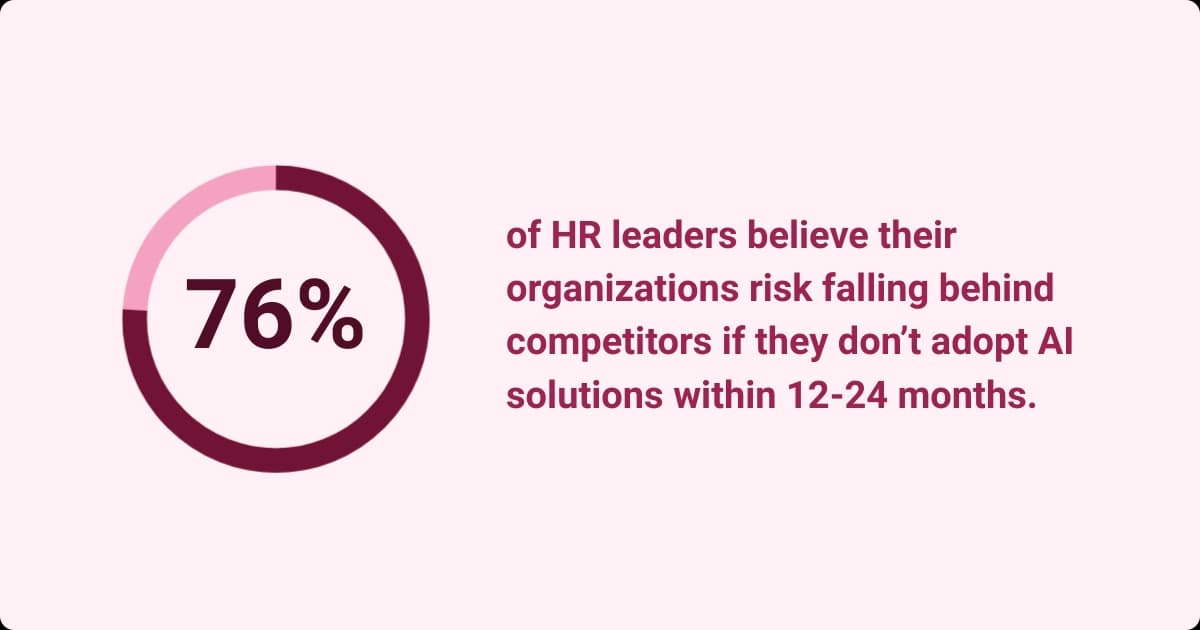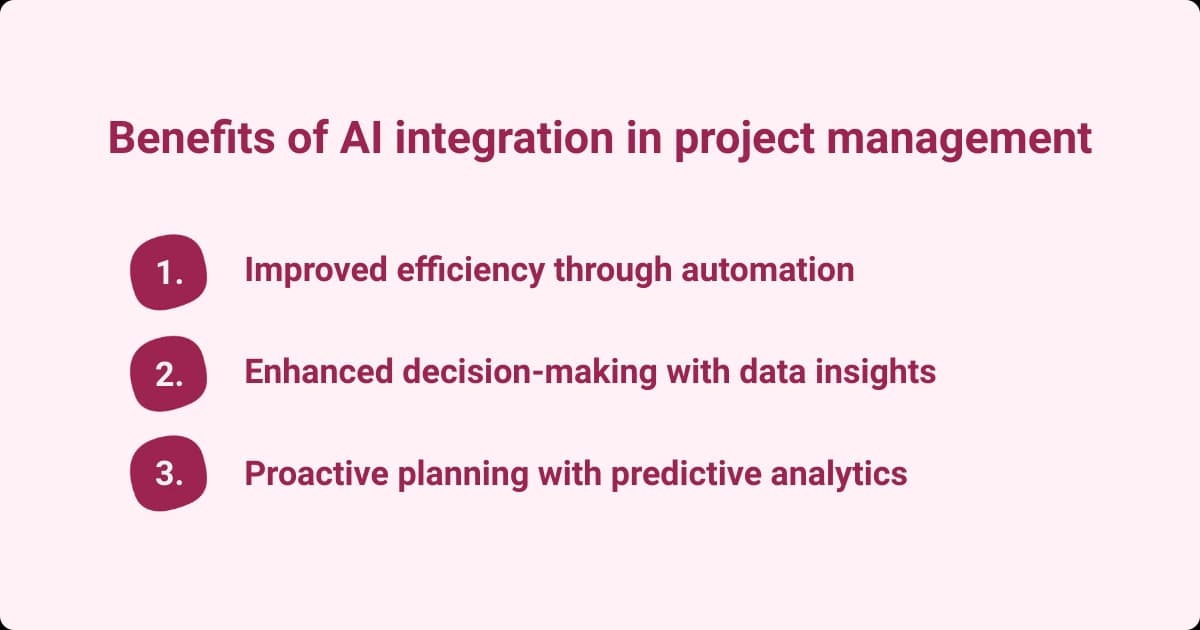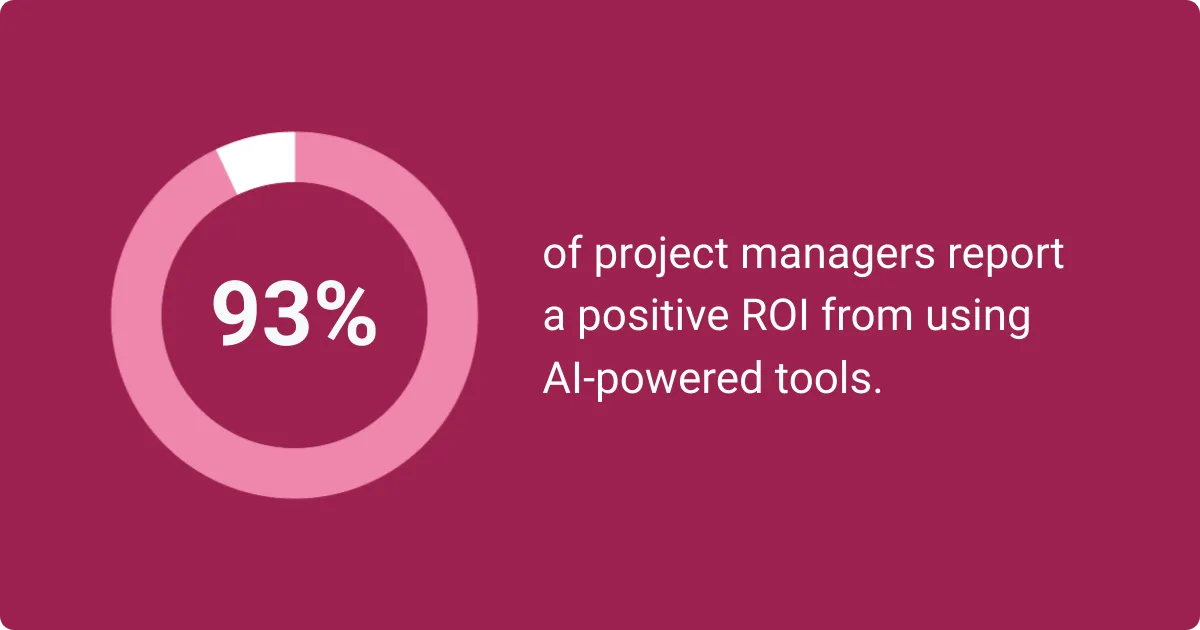AI in Project Management: Transforming Workflows and Driving Success
Table of contents
- What is AI in project management?
- What are the benefits of AI integration in project management?
- What are the best practices for implementing AI in project management?
- How is AI used in project management?
- AI project management tools
- Addressing challenges and critical areas of AI application in project management
- Case study of AI success in project management: Fluor’s AI solution
- What is the future of project management with AI?

We are living in the AI revolution in project management. Gartner’s "How AI Will Reinvent Program and Portfolio Management" report predicts that by 2030, AI will handle up to 80% of project management tasks. This means project managers and organizations will need to shift to a new way of working.
Plus, as per an article by Harvard Business Review on "How AI Will Transform Project ManagementOpens in a new tab," only 35% of projects are completed successfully, says The Standish Group. There is a whole lot of unrealized potential in the other 65%. It is critical to understand how you can implement AI in project management to drive success.
What is AI in project management?
Artificial intelligence is transforming how we manage projects. Its strength lies in its capability to rapidly process massive volumes of data that enhance decision-making and boost efficiency with higher accuracy. Increasingly complex projects demanding faster, data-driven decisions have paved the way for AI to make recommendations in areas ranging from resource planning to project management objectives.
Let's not forget that automation waves goodbye to repetitive tasks such as entering and summarizing data, scheduling tasks, and tracking and reporting progress, freeing you up for the more important aspects of your work.
The report Upskill or Stand Still details how you can close gaps in usage and awareness of AI across organizations by creating a culture of continuous learning. Getting teams familiarized with the technology and tools available to them can improve their performance.
Technologies that power AI adoption in project management:
- Machine learning: Identifies patterns and makes predictions. Helps allocate resources and track project risks.
- Natural Language Processing (NLP): Enhances communication by analyzing text or speech. Drives tools like sentiment analysis for team feedback.
- Predictive analytics: Anticipates project outcomes and suggests timely interventions to avoid delays.
- AI-powered chatbots: Automate repetitive communication and answer common questions, freeing up managers' time.
These tools simplify workflows, making project management more agile and effective.
AI is no longer a luxury — it’s a necessity. In a survey of 105 HR leaders, Gartner found that 76% of HR leaders believe if their organizations do not adopt generative AI systems within 12 to 24 months, they will trail companies that do.

What are the benefits of AI integration in project management?
AI for project management can enhance almost any project or team. Let's explore some areas where AI brings its power:
Improved efficiency through automation
AI automation can accurately manage repetitive administrative tasks like resource allocation and status updates. You can shift your focus to a more agile framework, boosting productivity.
For example, agile team meetings can save you time on repetitive objectives by collecting real-time data and integrating it with tools like Slack or Trello. Also, AI algorithms can manage tasks automatically by analyzing team members' workloads and past performance to assign tasks efficiently.
Enhanced decision-making with data insights
AI augments human abilities and helps us overcome our limitations. For example, Machine learning processes vast volumes of aggregated data from multiple sources at unprecedented speed. Identifying patterns or anomalies can offer you real-time actionable insights that might otherwise be impossible to detect manually.
There is a wide array of tools like NLP that enable AI to include unstructured data, such as text or speech, alongside structured data. Here are some other tools that support enhanced decision-making:
- Pattern recognition
- Predictive analytics
- Prescriptive analytics
- Visualization and interpretation
Leveraging predictive analytics for proactive planning
Using predictive AI, you can identify potential issues early and adjust plans, minimizing disruptions and keeping your projects on track. It also helps set realistic deadlines and manage expectations.

What are the best practices for implementing AI in project management?
Research "The Root Causes of Failure for Artificial Intelligence Projects and How They Can Succeed" by the Rand Corporation states over 80% of AI projects are destined to fail. Implementing AI in project management with a thoughtful approach can put you in the other 20%. Success depends on preparation, clear communication, and collaboration.
Ensure providing high-quality data for reliable AI performance
The performance of artificial intelligence depends heavily on the quality of the data it processes. Clean and structured data enables AI to provide meaningful insights and improve project outcomes. Inaccurate or biased data leads to unreliable outcomes, undermining trust in AI. Protecting data integrity through regular audits and proper data management practices is essential.
Fostering collaboration among diverse teams
Resistance to adoption can slow progress. Organizations that are more successful at integrating AI establish structures that promote collaboration between cross-functional teams.
- AI champions can advocate for AI adoption and guide its implementation
- Providing training and workshops helps team members build confidence in using AI tools.
- Encouraging open dialogue keeps everyone feeling involved in the transition process
Tools like Conversations® combine agile performance development with structured feedback and assessments to create a culture of connection and continuous feedback.
Did you know that 65% of HR executives are seeking better quality manager-employee check-ins for feedback and coaching?
Workhuman's Conversations® solution is the tool you need. Enhance your interactions for more meaningful and effective employee engagement. Click here to discover how Workhuman can transform your feedback process.
Addressing stakeholder concerns for smoother adoption
Introducing AI can raise concerns about its impact on roles and workflows, such as job security or perceived increased complexity. As a leader, you can overcome this resistance by communicating the benefits of AI clearly and transparently:
- Explain how AI augments human skills rather than replaces them.
- Highlight its role in automating repetitive tasks and enabling more strategic contributions.
- Provide regular updates and feedback sessions to reassure stakeholders and promote acceptance.
How is AI used in project management?
Organizations are increasingly adopting AI for its diverse capabilities. A Capterra survey on "The State of AI in PM: Leading Project Manager Unpacks Brand New Capterra DataOpens in a new tab ", found that 93% of project managers report ROI from AI tools. AI boosts productivity by:
- Automating time-consuming tasks while reducing manual errors. Project managers are freed up to focus on high-level decision-making. Consistency and improved reliability are by-products.
- Optimizing resource allocation by identifying gaps and inefficiencies, improving timelines and team balance. Offering data-driven insights for better planning and guiding decisions on risks, priorities, and challenges. These benefits empower project managers to achieve goals more effectively and efficiently.
There are some important steps to consider when developing a comprehensive AI strategy for success. A structured approach is key to successful AI integration.
- Step 1: Align AI initiatives with business objectives: Define what success looks like and how AI will improve project outcomes.
- Step 2: Assess AI readiness: Review current capabilities for gaps in infrastructure, data, and workforce and how well they can support AI.
- Step 3: Build a strong data foundation: Without strong data governance and clean, high-quality data, AI algorithms will fail to create meaningful insights.
- Step 4: Define AI use cases: Create practical examples of how AI will solve specific issues in the business.
- Step 5: Select the right AI tools and technologies: Choose the right systems that fit your existing systems, budget, and timelines and also consider scalability.
- Step 6: Create a skilled AI team: Training and upskilling get your team ready to use AI effectively.
- Step 7: Implement governance and ethical guidelines: Build trust by addressing issues like bias and transparency with strong ethical frameworks that have accountability and explainability.

AI project management tools
There are significant benefits to using popular AI project management tools.
Role of tools
AI’s advanced methodologies and technology are a powerful solution to complex issues that can expand the capabilities of organizations past human limitations. The Workhuman® iQ platform, for example, helps teams improve collaboration and manage skills effectively.
Workhuman iQ can transform your understanding of the employee experience with AI-powered social analytics to unlock data-driven strategy. It's the kind of intel you’ve always wanted, delivered in a way that anyone can use.
It's an expansive AI that gives unparalleled views of people dynamics, cultural health, program performance, skills, and more. This elevates ROI, productivity, retention, and the role of HR, giving broad and rich decision-making capability.
Improving collaboration and communication within teams
AI tools simplify team communication by centralizing information and updates. They provide real-time alerts, keeping everyone aligned with project goals. Tools like Workhuman Conversations® create a culture of ongoing feedback that drives higher-quality check-ins linked to recognition, which can help you reimagine your performance philosophy.
Leveraging virtual project assistants for task prioritization
Virtual project assistants generally come with specialized skills that enhance your business operations. These tools analyze project requirements, from deadlines to resource availability. They will then delegate routine tasks, providing optimal task sequencing and a better workload balance.
AI tools in project management
Let’s explore some common project management tools:
ClickUp
Pros:
- Highly customizable
- Integrates with multiple platforms
- Supports task automation
- Offers detailed reporting features
Cons:
- Steep learning curve for new users
- Occasional performance issues with larger teams
- Limited Integrations
Asana
Pros:
- Intuitive interface
- Excellent for task delegation and progress tracking
- Timelines and boards support project visualization
- Many integrations
Cons:
- Limited functionality in the free version
- No advanced AI features like predictive analytics
- One-person-per-task limitation
- Misses location data custom fields
FirefliesAI
Pros:
- Automates meeting transcription and note-taking integrates with popular video conferencing tools
- Uses AI to identify key discussion points
- Provides AI summaries
Cons:
- Transcription accuracy may vary
- Advanced features require a premium subscription
- No multi-meeting intelligence
Notion
Pros:
- Combines note-taking and task management for better collaboration in one platform
- Highly flexible and customizable for any team size
Cons:
- Sold as an all-in-one project management tool, but it is mainly a note-based knowledge center
- Steep learning curve
- Can become disorganized without proper structure
- Lacks some specialized project management tools
Taskade
Pros:
- Great for real-time collaboration
- Simple task management features
- An easy-to-use interface
Cons:
- Less suitable for large, complex projects due to limited advanced features
- Basic design options
- Limited offline functionality
Addressing challenges and critical areas of AI application in project management
AI in project management offers immense advantages, but challenges must be addressed for ethical and effective use.
Navigating data privacy concerns in AI applications
AI systems often process vast quantities of sensitive data, making them attractive targets for cyberattacks. Hackers may exploit vulnerabilities in AI algorithms or storage systems to steal confidential information, such as financial details or healthcare records.
It is imperative that data is secure and complies with regulations like GDPR or CCPAl. Without transparent policies and safeguards, individuals risk losing control over their personal information. This leaves companies vulnerable to legal penalties and reputational harm.
Being ethical in artificial intelligence adoption requires implementing things like:
- Robust encryption methods
- Clear data policies to prevent breaches and misuse
- Regular audits to make sure systems are adhering to policies and ethical frameworks
Transparency about data usage will nurture consumer and stakeholder trust.
Ensuring unbiased and fair AI-driven decisions
AI model training data can inherit prejudices that reflect the unconscious biases of developers and even the usage data collected from users. This can sustain or intensify discrimination, leading to unfair or harmful outcomes, especially in areas like hiring or lending.
Streamlining resource management for optimal allocation
Resource management AI tools excel in analyzing resource availability and utilization while providing managers with real-time updates so they can adjust allocations dynamically. They are a centralized solution that brings together all aspects of your organization. Personnel, equipment, and finances all come under one roof.
By examining your team's capacities and workload distribution and cross-referencing them with project timelines, you can allocate resources efficiently. This prevents bottlenecks and reduces waste.
Enhancing risk management with real-time analysis
Being able to respond faster to emerging risks can be a game-changer. If you can identify potential risks early, you can tackle the issue before it becomes a wider problem.
Predictive analytics helps managers assess the likelihood of specific challenges and prepare contingency plans. This minimizes disruptions and improves project outcomes.
Case study of AI success in project management: Fluor’s AI solution
An early adopter of AI technology, Fluor has collaborated with IBM Research and IBM Services to develop a global data-centric strategy. Here is a detailed article about it: Fluor Uses IBM Watson to Deliver Predictive Analytics Capability for MegaprojectsOpens in a new tab. Its massively complex projects required new tools that can better analyze big data and gain higher value results across the whole life cycle.
Aim:
- Predict critical project outcomes
- Provide early insight into project health
- Understand the implications of rapidly changing factors in complex projects
- Keep complex projects on schedule and within budgets
- Improve resource allocation
- Improve cost efficiency
Fluor can now leverage the wealth of experience from its entire historical data store. Utilizing its global workforce knowledge, it can quickly understand markets and factor in impacts on cost and schedule. Fluor can drive certainty up and is becoming more efficient, which improves the quality of its services and decision-making.
What is the future of project management with AI?
The future of project management with AI is promising, with automation and smarter decision-making at the forefront. As AI technology continues to evolve, project management practices will shift toward more strategic and innovative approaches that lead us to higher efficiency.
Emergence of virtual project assistants as team enablers
In the future, AI-driven virtual project assistants will play a more significant role in day-to-day project operations. With AI handling administrative duties, project managers will be freed from mundane tasks, allowing them to focus on higher-level strategic planning and team management.
These virtual assistants will provide real-time updates and automate communication, improving team alignment and reducing miscommunication. Essentially, they will become an indispensable member of the team that improves efficiency across the board.
Redefining roles for project managers in an AI-driven landscape
As AI tools become more prevalent, project managers will need to understand how AI will augment their work so that they can shift to a more strategic oversight and decision-making position.
Changes in evolving mixed workforce dynamics will highlight how to be a good manager. Balancing human and AI teams will require improving interpersonal and emotional intelligence. This shift will help project managers become more effective leaders and focus on problem-solving and innovative approaches while AI takes care of the operational side of things.
Better project selection and prioritization with advanced tools
Analyzing vast volumes of data, historical and predictive, AI will significantly improve how projects are selected and prioritized. It bridges information in ways that would have been impossible.
Through its recommendations, you can identify which projects have the greatest potential for success. You can also easily allocate the optimal ingredients to reach your organizational goal. Through data-driven decisions, you can more accurately align project portfolios to business goals that deliver maximum value and reduce risk.
The Future of Project Management: AI-Powered Success
There are many benefits to using AI in management of complex projects. It marks a pivotal shift in approach to planning and execution. AI is no longer a supplementary tool but a transformative force reshaping methodologies and enhancing outcomes.
Being committed to continuous learning and embracing AI, you can position your organization to navigate complexities with greater precision, becoming more adaptable in the process as you find sustained success in an increasingly dynamic landscape.